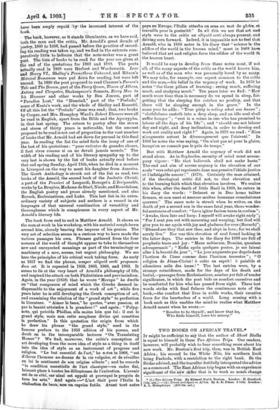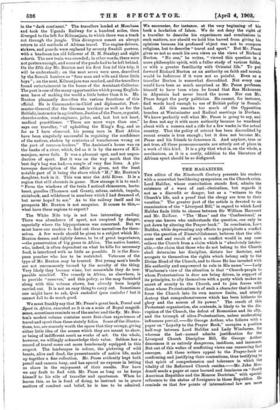TWO BOOKS ON AFRICAN TRAVEL.*
IT might be sUffici6,nt to eay that the author of Short Stalks is equal to himself in these Two African Trips. Our readers, however, will probably wish to hear something more about his new work. Mr. Buxton's first trip, then, was in British East Africa ; his secon4 to the White Nile, his southern limit being Fashoda, with &restriction to the right bank. SO the Sirdar advised, and the traveller dutifully interpreted the advice as a command. -the East Afridan trip began with an experience significant of the new *Ter that is to work so muck change - • (1.) Two Alrioon Trim. By Edward North Buxton. London : E. Stanford. D3a. net,)—(2.) Trawl and Sport in Africa. By A. E. BMW $ rola. London z A. L. Humphreys. [510 108. nat.]
in the "dark continent." The travellers landed at Mombasa and took the Uganda Railway for a hundred miles, then diverged to the left for Kilmanjaro, to which there was a track cut through the jungle. This divergence meant an abrupt return to old methods of African travel. The engine-drivers, stokers, and guards were replaced by seventy Swahili porters, with a headman (an old follower of H. M. Stanley) and eight askaria. The new train was crowded; in other words, there were not porters enough, and some of the goods had to be left behind. On the fifth day Mr. Buxton met his first lion (of this trip, it will be understood); on the next seven were seen, described by the Somali bunters as "four man and wife and three little boys " ; on the next, Kilmanjaro was reached, and the travellers found entertainment in the house of the Assistant-Collector. The post is one of the many opportunities which young English- men have of making the world a little better than it is. Mr. Buxton pleasantly describes the various functions of this official. He is Commander-in-Chief and diplomatist, Post- master-General (for the German territory as well as for the British), instructor in agriculture, Justice of the Peace, organist, churchwarden, road-engineer, jailor, and, last but not least, medical practitioner. "There are more ways than one," says our traveller, "of upholding the King's flag, and as far as I have observed, his young men in East Africa have been singularly successful in regaining the confidence of the natives, shaken by centuries of treacherous wrong on the part of caravan-leaders." The Assistant's house was on the banks of a river, which, fed as it is by the snows of Kil- manjaro, never fails. It was a pleasant spot, and not unpro- ductive of sport. But it was on the way north that the best day's bag was had,—a couple of very fine lions. A pic- turesque description of the affair is given, not the least notable part of it being the share which "M.," Mr. Buxton's daughter, took in it. This was near the Athi River. It is a region that still abounds in game. How strange it is to read: "From the windows of the train I noticed rhinoceros, harte- beest, gazelles (Thomson and Grant), zebras, ostrich, impala, steinbuck, and wildebeest in numbers which I had dreamed of, but never hoped to see." As to the railway itself and its prospects Mr. Buxton is not sanguine. It comes to this,— what have these regions to export?
The White Nile trip is not less interesting reading. There was abundance of sport, not unspiced by danger, especially where the hippopotamus was concerned. But we must leave our readers to find out these narratives for them- selves. A few words should be given to a subject which Mr. Buxton deems, and rightly deems, to be of great importance, —the preservation of big game in Africa. The native hunter, who, indeed, is often dependent on what he kills for necessary food, is interfered with as little as possible. It is the Euro- pean poacher who has to be restricted. Veterans of the type of Mr. Buxton may be trusted. But young men's heads are not uncommonly turned by the novelty of the thing. Very likely they become wiser, but meanwhile they do irre- parable mischief. The remedy in Africa, as elsewhere, is to provide "reserves," and this policy, as the map furnished along with this volume shows, has already been largely carried out. It is not an easy thing to carry out. Sometimes one might have to ask, Quis custodiet ipsos custody) ? but it cannot fail to do much good.
We must frankly say that Mr. Pease's gent book, Travel and Sport in Africa, executed as it is on a scale of Royal magnifi- cence, sometimes reminds us of the amber and the fly. Mr. Bux- ton's media volume contains more first-class experiences of travel and sport than these stately folios. Some of the illustra- tions, too, are scarcely worth the space that they occupy, giving either little idea of the scenes which they are meant to show, or being of indifferent merit as works of art. On the whole, however, we willingly acknowledge their value. Seldom has a record of travel come out more handsomely equipped in this respect. The landscapes in colour, the picturing of wild beasts, alive and dead, the presentments of native life, make up together a fine collection. Mr. Pease evidently kept both pencil and camera busy, and has spared no expense in letting us share in the enjoyment of their results. Nor have we any fault to find with Mr. Pease as long as he keeps himself to his role of traveller and sportsman. When he leaves this, as he is fond of doing, to instruct us in grave matters of conduct and belief, he is less to be admired. We encounter, for instant*, at the very -beginning of -his book a laudation of Islam.. We do not deny the right of a traveller to describe -his -experiences and conclusions in such matters, nor should we hold him barred from giving his opinions because his professed' object was not to compare religions, but to- describe "travel and sport." But Mr. -Pease gives us not so much his own views as the views of Richard Burton. "No one," he writes, "viewed this question in a more philosophic spirit, with a fuller study of various faiths, or with a greater familiarity with Oriental life." To put forward Richard Burton as an authority on faith and morals would be ludicrous if it were not so painful. Even as a traveller Burton is somewhat discredited. Not every one would have been as much surprised as Mr. Pease professes himself to have been when he found that Ras Makonnen in Abyssinia had never beard the name. Nor can Mr. Pease forget the party politician. He cannot, for instance, find words bard enough to use of British policy in Somali- land. All this smacks too much of the Opposition benches at Westminster and Radical meetings in Durham. We know perfectly well what Mr. Pease is going to say, and he does not say it with more authority because he wandered about with a camera and a rifle for a few weekkin the actual country. That the policy of retreat has been discredited by recent events is true enough ; but it does not become Mr. Pease and his friends to denounce it. And anyhow, true or not true, all these pronouncements are utterly out of place in a work of this kind. It is a pity that what is, on the whole, a meritorious, as it is a costly, addition to the literature of African sport should be so disfigured.











































 Previous page
Previous page